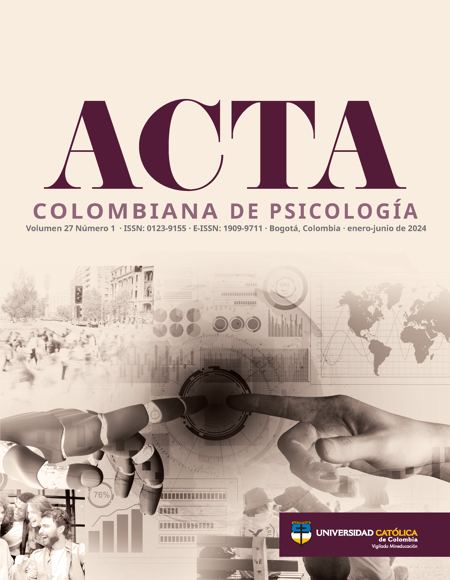
This work is licensed under a Creative Commons Attribution-NonCommercial-ShareAlike 4.0 International License.
Authors who publish in this journal agree to the following terms:
Acta Colombiana de Psicología complies with international intellectual property and copyright laws, and particularly with Article No. 58 of the Political Constitution of Colombia, Law No. 23 of 1982, and the Agreement No. 172 of September 30, 2010 (Universidad Católica de Colombia Intellectual Property Regulation).
Authors retain their copyright and grant to the Acta Colombiana de Psicología the right of first publication, with the work registered under Creative Commons attribution license, which allows third parties to use the published material, provided they credit the authorship of the work and the first publication in this Journal.
Abstract
Gratitude has been considered a protective factor against various mental illnesses, providing individuals with heightened positive feelings towards life, thereby promoting well-being. However, little exploration has been conducted on its relationship with life satisfaction and resilience. Therefore, the objective of this research was to identify whether there is a relationship between gratitude, resilience, and life satisfaction and to compare these factors based on gender and income among Colombian adults. A quantitative, non-experimental study with correlational scope was conducted. The Gratitude Questionnaire (G-20), Connor-Davidson Resilience Scale (CD-RISC 10), and Satisfaction with Life Scale (SWLS) were administered to a sample of 1099 Colombian participants, including 123 men, 971 women, and 5 others. Participants ranged in age from 19 to 67 years, with the majority earning monthly incomes between 400,000 COP-900,000 COP (96.06 USD-218.07 USD). The results revealed high levels of gratitude, resilience, and life satisfaction. Comparatively, no differences were found between men and women. Participants with higher incomes exhibited greater levels of gratitude and life satisfaction compared to those with lower incomes. Furthermore, strong positive correlations were found between gratitude, resilience, and life satisfaction. In conclusion, gratitude can be considered a favorable aspect for health, quality of life, and the improvement of other psychological conditions.

References
Vázquez, C., Duque, A., & Hervás, G. (2013). Satisfaction with Life Scale in a Representative Sample of Spanish
Adults: Validation and Normative Data. Spanish Journal of Psychology, 16(82), 1-15. https://doi.org/10.1017/
sjp.2013.82
Veenhoven, R. (1994). El estudio de la satisfacción con la vida. Intervención psicosocial, 3, 87-116. https://repub.eur.
nl/pub/16195/
Villalba, K. O., & Avello, R. (2019). Resiliencia como factor determinante para la satisfacción con la vida en
estudiantes universitarios. Educación Médica Superior, 33(3), 1-15. http://scielo.sld.cu/scielo.php?pid=
S0864-21412019000300007&script=sci_arttext&tlng=en
Vinaccia-Alpi, E., Parada, N., Quiceno, J. M., Riveros-Munévar, F., & Vera-Maldonado, L. A. (2019). Escala de satisfacción
con la vida (SWLS): análisis de validez, confiabilidad y baremos para estudiantes universitarios
de Bogotá. Psicogente, 22(42), 1-20. https://doi.org/10.17081/psico.22.42.3468
Watanabe, B. Y. A. (2005). Satisfacción por la vida y teoría homeostática del bienestar. Psicología y salud, 15(1),
-126. http://psicologiaysalud.uv.mx/index.php/psicysalud/article/view/826
Yeon, J., & Hee, W. (2021). The effect of gratitude and self-encouragement on depression in psychiatric inpatients
in Korea. Archives of Psychiatric Nursing, 35(3), 325-328. https://doi.org/10.1016/j.apnu.2020.12.004
Yildirim, M., & Alanazi, Z. S. (2018). Gratitude and life satisfaction: Mediating role of perceived stress. International
Journal of Psychological Studies, 10(3), 21-28. https://doi.org/10.5539/ijps.v10n3p21


































